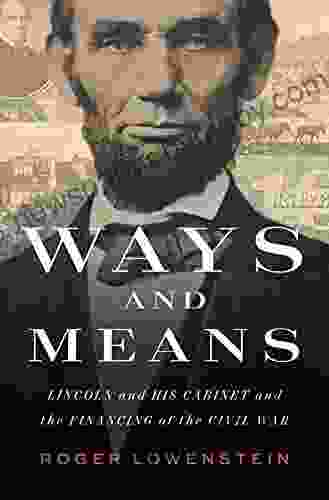Lincoln and His Cabinet: The Financing of the Civil War

4.6 out of 5
| Language | : | English |
| File size | : | 20259 KB |
| Text-to-Speech | : | Enabled |
| Enhanced typesetting | : | Enabled |
| Word Wise | : | Enabled |
| Print length | : | 445 pages |
| Screen Reader | : | Supported |
The American Civil War was the most expensive and destructive conflict in American history, costing an estimated $75 billion (in 2020 dollars) and claiming the lives of over 620,000 people.
Financing such a massive war effort was a daunting task for President Abraham Lincoln and his administration. The Union government had a limited revenue base and was already heavily in debt from previous wars.
To meet the financial demands of the war, Lincoln and his cabinet implemented a series of innovative and controversial measures, including the creation of a national banking system, the issuance of legal tender paper money, and the imposition of new taxes.
The Treasury Department, led by Secretary Salmon Chase, played a central role in financing the war effort. Chase was a brilliant and ambitious politician who had a deep understanding of finance. He worked tirelessly to raise revenue and to stabilize the Union's finances.
One of the most significant innovations of the Lincoln administration was the creation of a national banking system. Before the war, the United States had a decentralized banking system, with each state issuing its own currency.
This system was chaotic and unstable, and it made it difficult for the government to raise revenue. The National Banking Act of 1863 created a system of national banks that were chartered by the federal government and issued a uniform currency.
The national banking system helped to stabilize the Union's finances and to make it easier for the government to raise money. It also helped to create a more unified national economy.
Another important source of revenue for the Union government was the issuance of legal tender paper money, known as greenbacks. Greenbacks were not backed by gold or silver, but they were declared to be legal tender for all debts, public and private.
The issuance of greenbacks was a controversial measure, but it helped the government to meet its financial obligations. However, it also led to inflation, which eroded the purchasing power of the greenbacks.
In addition to issuing greenbacks, the Union government also raised revenue through taxation. The Revenue Act of 1861 imposed a new income tax, and the government also increased tariffs on imported goods.
These taxes helped to raise revenue, but they were also unpopular with some segments of the population. The income tax was particularly resented by wealthy people, who felt that they were being asked to bear an unfair share of the war's costs.
The financing of the Civil War was a complex and challenging task. Lincoln and his cabinet implemented a series of innovative and controversial measures to raise revenue and to stabilize the Union's finances.
These measures helped the Union to win the war, but they also had a lasting impact on the American economy and the role of the federal government in financing future wars.
Further Reading:
- Financing the Civil War (Civil War Trust)
- Financing the Civil War (History.com)
- The Financing of the Civil War (National Park Service)
4.6 out of 5
| Language | : | English |
| File size | : | 20259 KB |
| Text-to-Speech | : | Enabled |
| Enhanced typesetting | : | Enabled |
| Word Wise | : | Enabled |
| Print length | : | 445 pages |
| Screen Reader | : | Supported |
Do you want to contribute by writing guest posts on this blog?
Please contact us and send us a resume of previous articles that you have written.
 Book
Book Novel
Novel Page
Page Chapter
Chapter Text
Text Story
Story Genre
Genre Reader
Reader Library
Library Paperback
Paperback E-book
E-book Magazine
Magazine Newspaper
Newspaper Paragraph
Paragraph Sentence
Sentence Bookmark
Bookmark Shelf
Shelf Glossary
Glossary Bibliography
Bibliography Foreword
Foreword Preface
Preface Synopsis
Synopsis Annotation
Annotation Footnote
Footnote Manuscript
Manuscript Scroll
Scroll Codex
Codex Tome
Tome Bestseller
Bestseller Classics
Classics Library card
Library card Narrative
Narrative Biography
Biography Autobiography
Autobiography Memoir
Memoir Reference
Reference Encyclopedia
Encyclopedia Joan Didion
Joan Didion Ray Scippa
Ray Scippa Rupert Wilkey
Rupert Wilkey John Berendt
John Berendt Stephanie Mehta
Stephanie Mehta John Booss
John Booss Jim Whittaker
Jim Whittaker Roger Zelazny
Roger Zelazny S Meloni M D
S Meloni M D Zona Gale
Zona Gale Joan Nathan
Joan Nathan John F Wukovits
John F Wukovits Joe Kuster
Joe Kuster Ruhi Choudhary
Ruhi Choudhary Laura Alary
Laura Alary Joshua Brown
Joshua Brown Patrick Sweeney
Patrick Sweeney Marilyn Tausend
Marilyn Tausend Karin Tanabe
Karin Tanabe Marilyn Jansen
Marilyn Jansen
Light bulbAdvertise smarter! Our strategic ad space ensures maximum exposure. Reserve your spot today!

 Marvin HayesDiscover the Transformative Power of Advertising in China: Read "Brand New...
Marvin HayesDiscover the Transformative Power of Advertising in China: Read "Brand New... James JoyceFollow ·4.1k
James JoyceFollow ·4.1k Hugo CoxFollow ·5.8k
Hugo CoxFollow ·5.8k Brandon CoxFollow ·9.3k
Brandon CoxFollow ·9.3k Jerry HayesFollow ·10.1k
Jerry HayesFollow ·10.1k Elmer PowellFollow ·5.1k
Elmer PowellFollow ·5.1k Zachary CoxFollow ·3.6k
Zachary CoxFollow ·3.6k Benji PowellFollow ·5.3k
Benji PowellFollow ·5.3k Hudson HayesFollow ·3.4k
Hudson HayesFollow ·3.4k

 Jermaine Powell
Jermaine PowellThe Ultimate Guide to Unlocking Consistent Profitable...
Introducing the 2nd Edition of the...

 Yasunari Kawabata
Yasunari KawabataMinute Microskills Videos: The Ultimate Guide for Visual...
Unlock Your Potential with Bite-Sized Video...

 Nathan Reed
Nathan ReedUnveiling the Wonders of Yosemite through John Muir's...
Immerse yourself in the breathtaking beauty...

 Gabriel Garcia Marquez
Gabriel Garcia MarquezWhen You Find Me Novel: A Gripping Mystery Unravels
In the sleepy...

 Esteban Cox
Esteban CoxMountains of California: An Essential History of...
From the towering...

 Devin Ross
Devin RossComm Check: Unveiling the Heartbreaking Final Flight of...
Comm Check: The Final Flight of Shuttle...
4.6 out of 5
| Language | : | English |
| File size | : | 20259 KB |
| Text-to-Speech | : | Enabled |
| Enhanced typesetting | : | Enabled |
| Word Wise | : | Enabled |
| Print length | : | 445 pages |
| Screen Reader | : | Supported |










